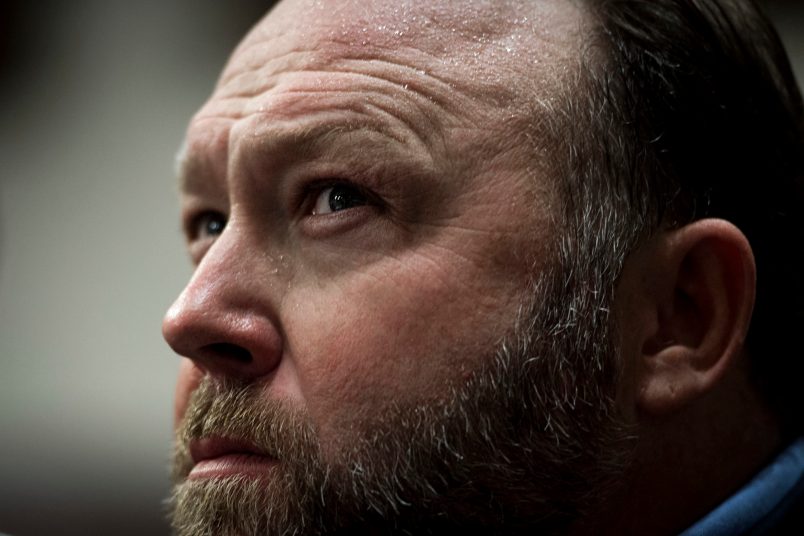Alex Jones is not the star he once was.
Banned from most major content platforms in 2018, Jones’ “InfoWars” network has now declared bankruptcy. The most prolific conspiracy theorist in America over the past decade is on the defensive against the parents of children slain in the Sandy Hook Elementary School mass shooting, who Jones infamously described as liars and crisis actors.
Still, Jones and InfoWars loom large over American politics. From Donald Trump to Marjorie Taylor Greene to the wave of library censorship and anti-trans laws around the country, Jones’ political approach — theatrical proclamations that everything is a conspiracy and the devil is pushing a globalist agenda — now defines the Republican Party.
So while Jones weathers the legal turbulence, likely aided by an alleged network of shell companies stashing his extensive revenue from cure-alls and survival meals, the media ecosystem he helped create is thriving.
“What he set out to create and put into motion will likely continue well past his personal involvement,” said Jared Holt, a resident fellow at Atlantic Council’s Digital Forensic Research Lab whose reporting on Jones played an outsized role in major companies like Apple and Spotify removing Jones from their platforms.
In other words, Jones’ success as the leader of the fringe spurred its own booming market: A mob of red-faced liars, profiting off of America’s deep well of suspicion and fear.
The Right’s ‘Guide To Reality’
After years as an AM radio host and early internet presence, Alex Jones’ latest era in many ways began in December 2015, when Trump called into InfoWars and courted its audience.
“Your reputation is amazing,” Trump told Jones. “I will not let you down.”
Trump’s campaign strategy followed Jones’ example, banking on lies about Barack Obama’s citizenship and other racist conspiracies, like Trump’s claim that he saw “thousands” of people cheering on Sept. 11, 2001, in areas of New Jersey “where you have large Arab populations.”
After Trump’s 2016 victory, Jones claimed to have received a thankful call from the president-elect, just before Trump parroted an InfoWars article claiming “millions” of illegal votes had been cast for Hillary Clinton.
But Jones’ alliance with Trump came at a cost: He was no longer an outsider. His conspiracy theories were being repeated by a president, and, among America’s right wing, were becoming increasingly mainstream.
“Trump represents Alex losing some of his autonomy,” said Dan Friesen, a longtime Jones observer and co-host of the Knowledge Fight podcast. “Once you’ve latched yourself onto the person who did win, now all of your time is going to be taken up with coming up with explanations for why the thing you pretended was going to happen isn’t happening. That’s not a brand that he’s good at.”
The Trump years also saw the rise of the next generation of frauds, liars and maniacs in Jones’ own image: People like Jack Posobiec, Mike Cernovich and Candace Owens, all of whom have appeared on InfoWars and, subsequently, coasted on the Jonesian style.
The biggest imitators aren’t confined to the fringe: Tucker Carlson hosts one of the most popular shows on cable, where, on many nights, he does little more than launder conspiracy theories. Last December, Carlson praised Jones on Fox News’ air, calling him “a far better guide to reality in recent years” than the mainstream media journalists like NBC’s Ken Dilanian or CBS’ Margaret Brennan.
When Jones was deplatformed by major social media companies in 2018, a few months after the families of Sandy Hook victims sued him, the next generation of Joneses was ready to fill the void, crowding him out even as he sought to build an audience on alternative platforms.
“The biggest thing that hurt Jones was losing his verified social media,” said Michael Edison Hayden, senior investigative reporter and spokesperson for the Southern Poverty Law Center.
Jones And The Capitol Attack
Though the social media defenestrations and budding competition hurt Jones, Donald Trump’s “Big Lie” about Democrats’ supposed theft of the 2020 election offered a juicy narrative: Evil Communist deep state plotters were working to overthrow Trump.
Jones found his sweet spot. Traffic at InfoWars’ store spiked in late 2020 and early 2021, the SPLC reported, and Jones was near the center of the pro-Trump resistance. Jones was also reportedly deeply involved in coordinating funding for the rallies that immediately preceded the attempted insurrection.
“We have only begun to resist the globalists. We have only begun our fight against their tyranny. They have tried to steal this election in front of everyone,” Jones told the rabid crowd in D.C. on the night of Jan. 5. “I don’t know how this is all going to end, but if they want to fight, they better believe they’ve got one.”
The fight didn’t come from Jones, though: On the day of the attack itself, Jones — armed with a bullhorn and a phalanx of supporters — seemed overwhelmed as his conspiracy theories culminated in violent action by those who took him at his word. Video showed him trying to divert the crowd to an area outside the Capitol Building. Jones has avoided prosecution, though his acolyte Owen Shroyer wasn’t so lucky.
Still, Jones’ influence that day was clear. As the dust settled, right-wing consensus quickly formed around the most Jonesian strategy available: Just say it was a false flag.
Observers who spoke to TPM agreed that despite the bankruptcy filings, Jones likely isn’t going anywhere. His videos can still gain hundreds of thousands of views, though he’s far from the pre-eminent voice he once was.
One thing has remained the same: The endless grift.
On his Monday show, Jones’ denied that InfoWars had declared bankruptcy, calling instead “a Chapter 11 reorganization.” Meanwhile, his livestream video platform broadcast familiar pre-recorded plugs from the InfoWars online store: An herbal tincture, and a t-shirt with the bold text, “Alex Jones Was Right.”



